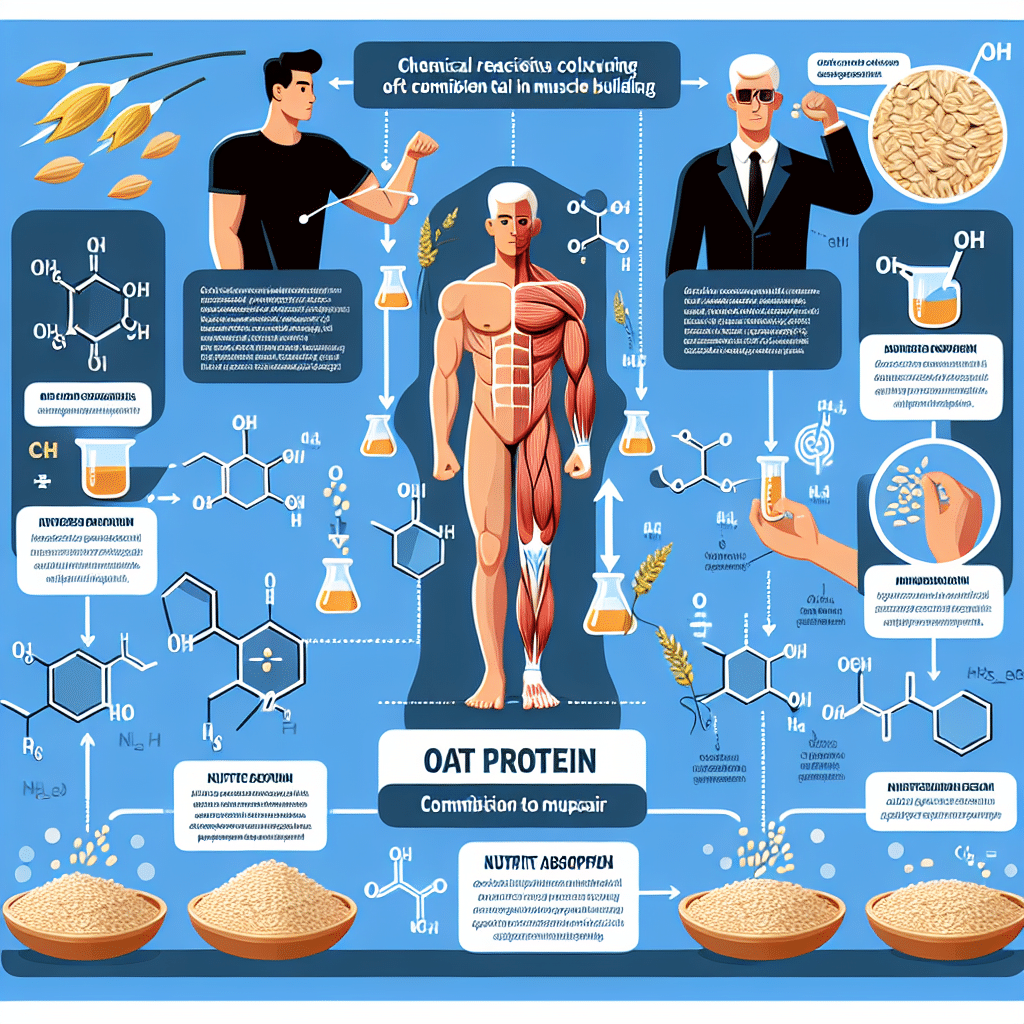Does Oat Protein Build Muscle?
-
Table of Contents
- Oat Protein and Muscle Building: A Comprehensive Analysis
- Understanding Protein and Muscle Synthesis
- Oat Protein: Composition and Quality
- Comparing Oat Protein to Other Protein Sources
- Integrating Oat Protein into a Muscle-Building Diet
- Case Studies and Research on Oat Protein and Muscle Growth
- Practical Examples of Oat Protein in Muscle-Building Meals
- Conclusion: The Role of Oat Protein in Muscle Building
- Discover ETprotein’s High-Quality Protein Products
Oat Protein and Muscle Building: A Comprehensive Analysis

When it comes to building muscle, protein is the cornerstone of many fitness enthusiasts’ diets. With the rise of plant-based nutrition, oat protein has emerged as a potential alternative to traditional animal-based proteins. This article delves into the effectiveness of oat protein in muscle synthesis, comparing it to other protein sources, and examining its role in a muscle-building diet.
Understanding Protein and Muscle Synthesis
Protein is essential for muscle repair and growth. When you exercise, especially during resistance training, you create microscopic tears in your muscle fibers. Protein provides the amino acids necessary to repair these tears, which in turn leads to muscle growth. The quality of protein is determined by its amino acid profile and digestibility, which are crucial for muscle protein synthesis.
Oat Protein: Composition and Quality
Oat protein is derived from oats, a whole grain known for its health benefits. Oats are not only a good source of complex carbohydrates but also contain a decent amount of protein. However, the protein in oats is not complete, as it lacks adequate amounts of some essential amino acids, particularly lysine.
Despite this, oat protein has a relatively high biological value compared to other plant proteins. This means that it can still contribute to muscle protein synthesis, albeit not as effectively as complete proteins found in animal products or other plant-based sources like soy or pea protein.
Comparing Oat Protein to Other Protein Sources
When building muscle, it’s important to consider the quality of the protein you’re consuming. Here’s how oat protein stacks up against other popular protein sources:
- Whey Protein: Whey is a complete protein with a high biological value and is rapidly absorbed by the body, making it a favorite among athletes.
- Casein Protein: Casein is also a complete protein but is digested slowly, providing a steady release of amino acids over time.
- Soy Protein: A plant-based option that is complete in essential amino acids and has a good digestibility score.
- Pea Protein: Another plant-based protein that is rich in branched-chain amino acids (BCAAs), which are crucial for muscle building.
While oat protein may not be as potent as these alternatives, it can still play a role in a balanced diet aimed at muscle growth, especially for those seeking plant-based options.
Integrating Oat Protein into a Muscle-Building Diet
To maximize muscle growth with oat protein, it’s important to combine it with other protein sources to ensure you’re getting all the essential amino acids. Here are some strategies:
- Incorporate a variety of protein sources, including legumes, nuts, seeds, and other grains, to create a complete amino acid profile.
- Consider supplementing with BCAA or lysine to make up for the lower levels in oat protein.
- Consume adequate amounts of oat protein to meet your daily protein requirements, which may be higher for those engaging in regular resistance training.
Case Studies and Research on Oat Protein and Muscle Growth
Research on oat protein specifically in the context of muscle growth is limited. However, studies on plant-based diets and muscle building provide some insights. For example, a study published in the American Journal of Clinical Nutrition found that plant-based proteins can support muscle repair and growth when consumed in sufficient quantities and complemented with other protein sources.
Another study in the Journal of the International Society of Sports Nutrition highlighted the importance of protein timing and distribution throughout the day. Consuming protein from various sources, including oats, at different meals can optimize muscle protein synthesis.
Practical Examples of Oat Protein in Muscle-Building Meals
Here are some ways to incorporate oat protein into your diet:
- Start your day with a bowl of oatmeal topped with nuts and seeds for added protein and essential fats.
- Use oat flour in protein pancakes or waffles, combined with other high-protein ingredients like eggs or Greek yogurt.
- Snack on homemade oat protein bars with added protein powder or nut butter.
Conclusion: The Role of Oat Protein in Muscle Building
Oat protein can contribute to muscle growth when used as part of a diverse and balanced diet. While it may not be as effective as some animal-based or other plant-based proteins, it still offers nutritional benefits and can be a valuable component of a muscle-building regimen, particularly for those following a plant-based diet.
Discover ETprotein’s High-Quality Protein Products
If you’re looking to enhance your muscle-building efforts with high-quality protein sources, consider ETprotein’s range of organic bulk vegan proteins. Their products, including organic rice protein, pea protein, and various seed proteins, provide excellent plant-based options to support your fitness goals.
ETprotein’s offerings are characterized by a neutral taste, non-GMO, allergen-free attributes, and high purity levels, making them suitable for a wide range of applications. Whether you’re involved in sports nutrition, weight management, or general health and wellness, ETprotein has a protein solution for you.
For those interested in incorporating oat protein into their diet, ETprotein’s products can complement oat protein’s amino acid profile, ensuring you get the full spectrum of essential amino acids necessary for optimal muscle growth.
About ETprotein:
ETprotein, a reputable protein and L-(+)-Ergothioneine (EGT) Chinese factory manufacturer and supplier, is renowned for producing, stocking, exporting, and delivering the highest quality organic bulk vegan proteins and L-(+)-Ergothioneine. They include Organic rice protein, clear rice protein, pea protein, clear pea protein, watermelon seed protein, pumpkin seed protein, sunflower seed protein, mung bean protein, peanut protein, and L-(+)-Ergothioneine EGT Pharmaceutical grade, L-(+)-Ergothioneine EGT food grade, L-(+)-Ergothioneine EGT cosmetic grade, L-(+)-Ergothioneine EGT reference grade and L-(+)-Ergothioneine EGT standard. Their offerings, characterized by a neutral taste, non-GMO, allergen-free attributes, with L-(+)-Ergothioneine purity over 98%, 99%, cater to a diverse range of industries. They serve nutraceutical, pharmaceutical, cosmeceutical, veterinary, as well as food and beverage finished product distributors, traders, and manufacturers across Europe, USA, Canada, Australia, Thailand, Japan, Korea, Brazil, and Chile, among others.
ETprotein specialization includes exporting and delivering tailor-made protein powder and finished nutritional supplements. Their extensive product range covers sectors like Food and Beverage, Sports Nutrition, Weight Management, Dietary Supplements, Health and Wellness Products, and Infant Formula, ensuring comprehensive solutions to meet all your protein needs.
As a trusted company by leading global food and beverage brands and Fortune 500 companies, ETprotein reinforces China’s reputation in the global arena. For more information or to sample their products, please contact them and email sales(at)ETprotein.com today.












